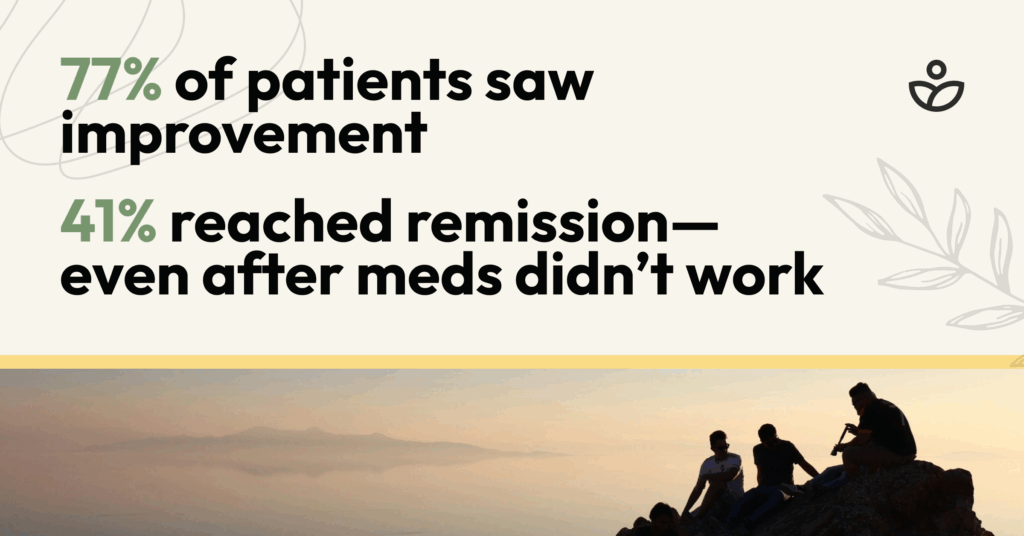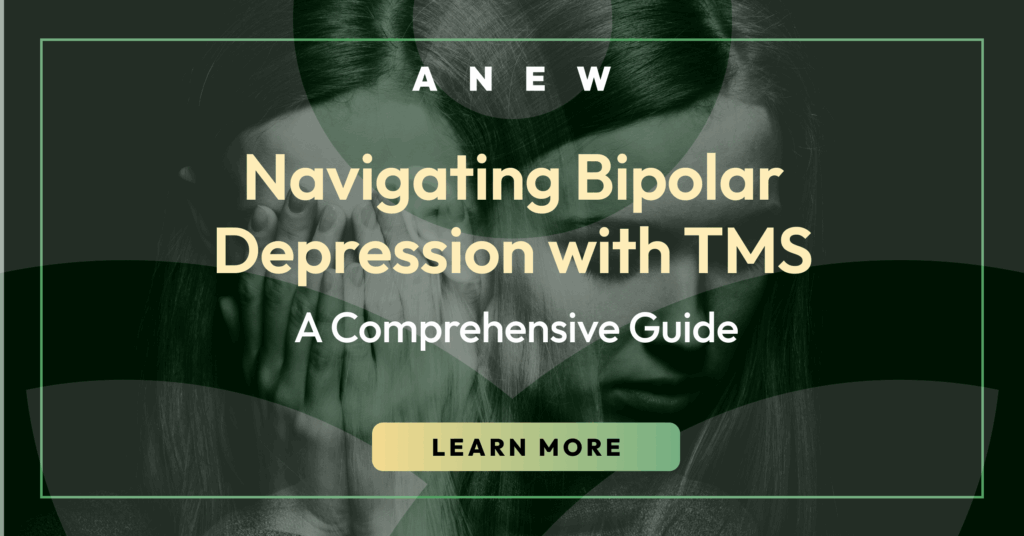Transcranial Magnetic Stimulation (TMS) for bipolar depression presents an innovative noninvasive treatment offering hope to those battling mood disorders. While TMS is not a standalone cure, its role in managing depressive episodes in bipolar disorder is promising.
Key points to know:
- Noninvasive: TMS uses magnetic fields to stimulate brain nerve cells without surgical intervention.
- Targeted Treatment: It particularly benefits the dorsolateral prefrontal cortex, a brain area linked to mood regulation.
- Safety Profile: Common side effects are mild, such as headaches; severe adverse effects are rare.
- Current Use and Research: While TMS is well-established and FDA approved for unipolar depression, its application in bipolar disorder is still expanding.
At Anew Therapy Utah, our team of compassionate psychiatric providers is dedicated to offering the most innovative treatments available. We specialize in helping individuals find relief from bipolar depression and other mental health challenges—especially when traditional approaches haven’t worked. If you’re exploring new options, read on to learn more about TMS for bipolar disorder, or visit our TMS services page to schedule an evaluation.

Understanding TMS for Bipolar Depression
How TMS Works
Transcranial Magnetic Stimulation (TMS) is a noninvasive treatment that uses magnetic fields to stimulate areas of the brain involved in mood regulation. A small magnetic coil is placed on the scalp, delivering focused pulses that activate neurons in the dorsolateral prefrontal cortex—a region closely tied to emotional processing.
This targeted stimulation helps modulate neural activity and may restore balance in brain circuits affected by depression. While TMS doesn’t involve medication during the procedure itself, it is not a substitute for medication in all cases. For individuals with bipolar depression, TMS is only considered safe and effective once the condition is stabilized with appropriate medication. When used under proper medical supervision, TMS can be a powerful tool in managing hard-to-treat depressive symptoms.
TMS and Bipolar Depression
For individuals living with bipolar disorder, the depressive episodes can be especially challenging—often lasting longer and hitting harder than the manic phases. TMS for bipolar depression offers a promising, non-drug-based alternative for managing these low points, especially for those who haven’t found success with medications or traditional therapy.
Though TMS is currently FDA-approved for major depressive disorder, it has gained attention as a potential treatment for bipolar depression as well. In fact, TMS treatment for bipolar depression has received Breakthrough Device Designation from the FDA, highlighting its potential to fill a critical treatment gap. Ongoing studies continue to show encouraging results, with many patients experiencing substantial improvement in mood and daily functioning.
TMS for bipolar disorder typically focuses on managing the depressive phase rather than manic symptoms. Patients who respond well to the therapy often describe a return of motivation, clearer thinking, and a renewed sense of stability—all without the side effects of traditional medication.
A retrospective analysis found that among patients with bipolar depression who completed a course of TMS:
- 77% met response criteria, indicating a significant reduction in depressive symptoms.
- 41% achieved remission, meaning their symptoms were minimal or absent after treatment.

Making Sure TMS Is Safe for You
TMS is not a fit for everyone with bipolar disorder. There are specific safety considerations to keep in mind:
- Contraindicated: TMS is not recommended for individuals with bipolar disorder that includes psychotic features
- Not appropriate when untreated: Patients must be medicated and stabilized before starting TMS
- Mania risk: There is a small risk of triggering a manic episode, which is why close monitoring and proper diagnosis are essential
Before starting treatment at Anew Therapy, all patients meet with a psychiatric provider for a full medical evaluation. This helps ensure TMS is a safe and effective fit based on your mental health history and current condition.
Benefits and Side Effects
TMS has helped many people find lasting relief from depressive symptoms. Patients often describe improvements in mood, clarity, and daily functioning. Some of the key benefits include:
- No systemic side effects: TMS doesn’t involve medication, so you avoid issues like weight gain, sexual side effects, or fogginess
- Well-tolerated: Most people report only mild discomfort during sessions—often a tapping sensation on the scalp
- Minimal downtime: There’s no sedation or recovery period, so you can resume normal activities immediately after each session
Potential side effects are typically mild and short-lived. These may include:
- Headaches
- Scalp tingling or discomfort
- Lightheadedness
- Rare risk of seizure (extremely uncommon when proper protocols are followed)
Insurance Coverage
TMS is FDA-approved for major depressive disorder and is covered by most major insurance providers when clinical criteria are met. At Anew Therapy, we’ll guide you through the approval process and help you understand your benefits so there are no surprises. Our team is here to make your care as accessible and stress-free as possible.
In summary, TMS is a promising, well-tolerated option for managing bipolar depression—but only when the condition is properly diagnosed and stabilized. At Anew Therapy, we take the time to evaluate your needs and offer other advanced treatments as well, including Spravato (esketamine nasal spray) and IM ketamine therapy. These approaches are often covered by insurance and can provide fast, effective relief for treatment-resistant depression.
Conclusion
At Anew Therapy Utah, we take a personalized, whole-person approach to mental health care. We know that bipolar depression affects everyone differently, and we’re here to help you find the treatment path that truly fits your life and needs.
Our focus is on rapid, effective relief—without compromising safety or personalization. In addition to TMS, we offer advanced treatments like Spravato, an FDA-approved esketamine nasal spray, as well as intramuscular (IM) ketamine therapy, both designed to deliver fast symptom improvement for those facing treatment-resistant depression.
If you’re exploring TMS for bipolar depression, you’re not alone—and you don’t have to navigate it on your own. Our team at Anew Therapy takes the time to understand your full medical and mental health history before recommending any treatment. Whether you’re new to TMS or considering it after other approaches haven’t worked, we’re here to answer your questions, offer guidance, and make sure every step of your care is grounded in compassion and clinical expertise.
For more information about TMS treatment at Anew Therapy, visit our TMS Therapy page.
No matter where you are on your mental health journey, we’re here to walk with you. From first consultation to ongoing support, our experienced providers are dedicated to helping you feel better—faster—and to building a future you feel hopeful about.

Searching for the best TMS clinic in Utah? Anew Therapy offers expert care and proven results. Schedule your free evaluation today.

